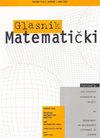关于杜杰拉唯一猜想的注解
IF 0.5
4区 数学
Q3 MATHEMATICS
引用次数: 0
摘要
利用二元二次丢芬图方程的性质,证明了如果\(r=p^{m} q^{n}\),其中\(p, q\)为异奇素数,\(m, n\)为正整数,则方程\(x^{2}-\left(r^{2}+1\right) y^{2}=r^{2}\)最多有一个含有\(y \lt r-1\)的正整数解\((x, y)\)。本文章由计算机程序翻译,如有差异,请以英文原文为准。
A note on Dujella's unicity conjecture
Using properties of binary quadratic Diophantine equations, we prove that if \(r=p^{m} q^{n}\), where \(p, q\) are distinct odd primes and \(m, n\) are positive integers, then the equation \(x^{2}-\left(r^{2}+1\right) y^{2}=r^{2}\) has at most one positive integer solution \((x, y)\) with \(y \lt r-1\).
求助全文
通过发布文献求助,成功后即可免费获取论文全文。
去求助
来源期刊

Glasnik Matematicki
MATHEMATICS, APPLIED-MATHEMATICS
CiteScore
0.80
自引率
0.00%
发文量
11
审稿时长
>12 weeks
期刊介绍:
Glasnik Matematicki publishes original research papers from all fields of pure and applied mathematics. The journal is published semiannually, in June and in December.
 求助内容:
求助内容: 应助结果提醒方式:
应助结果提醒方式:


